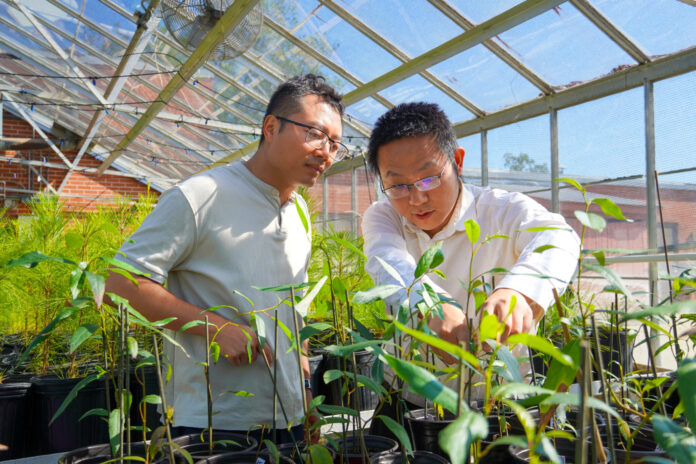
AUBURN, Ala. – A team of faculty at the Auburn University College of Forestry, Wildlife and Environment (CFWE) are pursuing more sustainable forms of agroforestry thanks to a new grant awarded by the USDA National Institute of Food and Agriculture (NIFA). Their research will focus on the genetics of trees and their domestication for wood pulp production — ultimately maximizing economic gains and reducing environmental impacts.
Assistant Professor of Forest Genomics Hao Chen and Assistant Professor of Forest Ecophysiology Chen Ding are focusing their research on greenhouse-grown varieties of poplar trees, a species that has the potential to revolutionize pulp mills by increasing their yield of sustainable fibers up to 40% while reducing carbon emissions.
Fueled by NIFA as part of the Critical Agriculture Research and Extension (CARE) program, the team’s poplar field trials will use the cutting-edge genome-editing technology system, CRISPR, to create and study trees containing lower amounts of lignin. Every tree contains this material which serves as the adhesive between tree fibers, providing rigidity and making wood pulping more of a challenge.
Pulp is a biodegradable, renewable resource made from trees. When trees such as poplars are harvested for pulp production, they undergo a refining process called pulping or delignification that expends energy, emits gases and can prove costly. Pulping is reliant on successfully removing specific amounts of lignin to create forest products such as paper, tissues and wood pellets.
Improving the delignification process will allow increased short-rotation harvests, creating more consistent revenue streams and reducing costs for stakeholders, while also keeping the United States pulp and paper industry competitive.
Following the COVID-19 pandemic, the costs of necessary wood pulping chemicals and energy increased for pulp and paper production mills. This financial stress makes Chen and Ding’s research increasingly important to the industry. Chen, who serves as principal investigator (PI) of this project, says that their work has the potential to revolutionize pulpwood production.
“The research aims to address the challenges of developing and evaluating genetically modified poplar varieties with modified lignin properties that can thrive in the South’s environmental conditions while enhancing pulping efficiency,” Chen said. “The project seeks to determine whether these CRISPR-edited poplar varieties can withstand the stresses encountered outside of controlled greenhouse environments, maintain improved pulp yield performance through cycles of growth and dormancy and offer increased productivity, profitability and sustainability within agroforestry systems.”
Co-PI Jack Wang, director of the Forestry Biotech Group (FBG) at North Carolina State University, is contributing his extensive forest biotechnology experience to this effort. The FBG utilizes AI-based data modeling platforms, wood property analysis, micro kraft pulping and life cycle carbon footprint analysis in its research. The test tree varieties used by Chen and Ding for this study were generated in Wang’s lab.
“Our project involves a two-year field trial of these poplar varieties to conduct biannual assessments of resilience, growth and wood properties of the poplar varieties,” said Chen.
Additionally, Chen says the results can be swiftly adopted by agroforestry stakeholders in the southern U.S. The goal of the study is to empower landowners and mills to embrace a climate-smart agroforestry approach — increasing economic gains while advancing environmental sustainability.
The project will not stop in the lab. By sharing the study results through specialized workshops and online forums, the team’s outreach will empower forest landowners, pulp mill managers and other stakeholders with practical guidance on agroforestry practices. The delignification process using the new poplar tree varieties is also expected to reduce greenhouse gases, chemical usage and energy consumption.
This grant is one of several research endeavors currently being conducted by CFWE faculty. For more information about CFWE research, visit https://cfwe.auburn.edu/research.




















